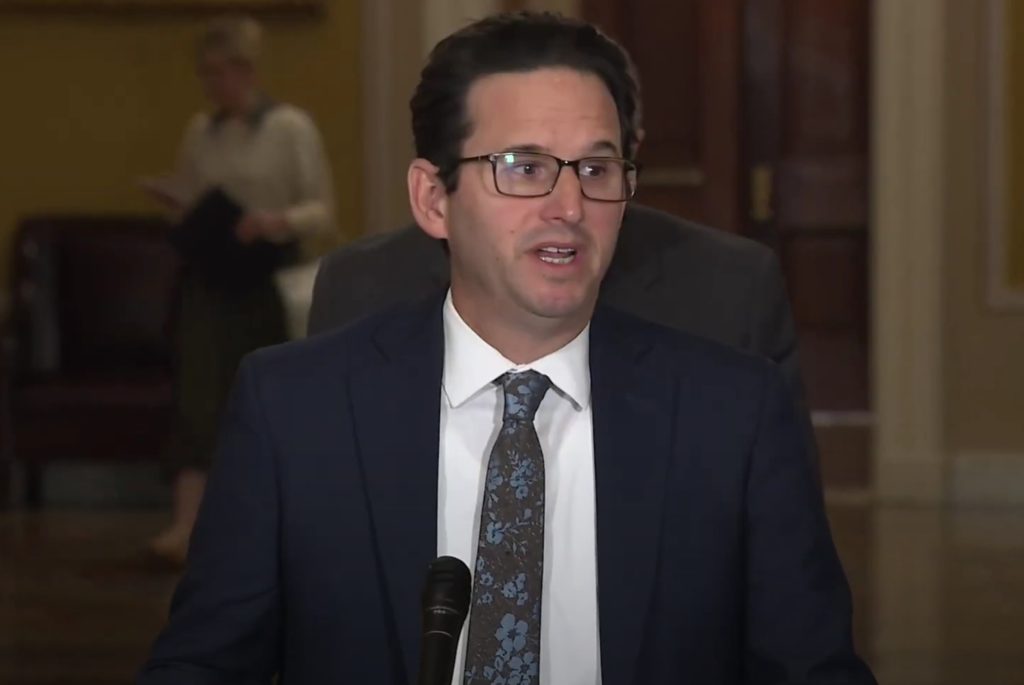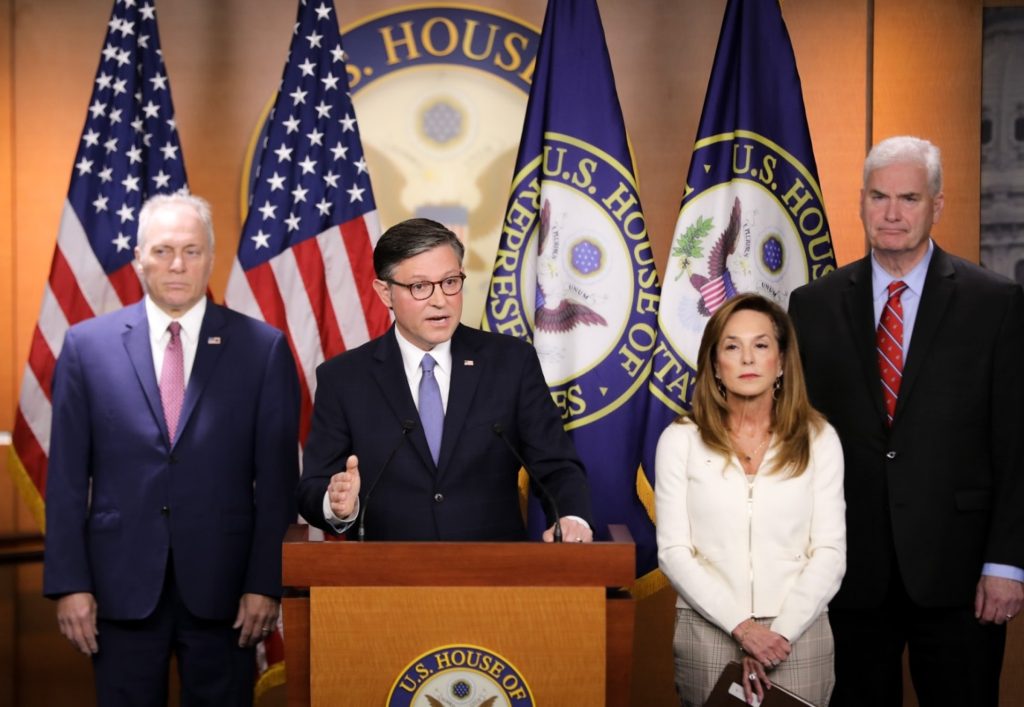VIDEO: Schatz says it’s not about money, there’s enough — just not enough for you
U.S. Senator Brian Schatz on Day 21 of the second longest federal government shutdown in American history Tuesday called on Republicans to work with Democrats to stop health care costs from rising and reopen the government.
“This is not about money. There is enough money to bail out Argentina with $20 billion. There is enough money to purchase a brand new aircraft for $173 million for the Homeland Security Secretary. There is enough money to renovate the White House ballroom,” said the Hawai‘i Democrat on Tuesday during a press conference with U.S. Senate Democratic leadership in Washington.
What there’s not enough money for under this Republican government, he continued, is you.
“There’s not enough money for you,” Schatz emphasized.
U.S. House Republicans have been gone from the U.S. Capitol for more than a month — “more than a month,” Schatz reiterated.
“They’ve worked 2 weeks out of the last 3 months. Nice work if you can get it,” he added sardonically.
The Hawai‘i Democrat is astonished that the party in charge of the government “literally won’t show up to work” during the second longest shutdown in American history.
Schatz spoke Oct. 8 on the Senate floor and called on Republicans to work with Democrats to reopen the government to stop health care costs from rising for millions of people.
He also at that time called on House Republicans to return to work after having more than a month off in August.
Especially with the nation facing what some Democrats coined an impending health care crisis as the price of health care for 22 million Americans face a price hike of 114% or possibly losing health insurance coverage completely.
All but three Senate Democrats are blocking a Republican-led stopgap funding bill because President Donald Trump and enough Republican lawmakers won’t agree to an extension of an enhanced Affordable Care Act tax credit, set to expire Dec. 31.
“Get back to work,” Schatz said Oct. 8. “Help us help you, Republicans. You created this mess. We’re simply saying we can open the government tomorrow morning if Donald Trump and Republicans realize that they’re hurting their own people.”
He added that the GOP’s signature legislative achievement — the One Big Beautiful Bill Act — is now dragging on Republicans’ electoral chances, and if Democrats were a bit more cynical, they’d just let them stew in it.

But those 22 million people who are about to see their health care costs dramatically skyrocket or possibly disappear need relief.
“So there is only one way out of this shutdown, and it starts with the House of Representatives reporting for duty,” Schatz said Monday.
Trump on Tuesday said he would only meet with the top 2 Democratic Congressional leaders if the government shutdown ends.
“I would like to meet with both of them, but I said one little caveat, I will only meet if they let the country open,” Trump told reporters, according to Reuters, talking about a recent request for a meeting “anytime, anyplace” from U.S. Senate Minority Leader Chuck Schumer and House Minority Leader Hakeem Jeffries, both of New York.
Meanwhile, Republican Congressional leadership is starting conversations about what happens next as the stalemate with Democrats continues.
A handful of Senate Democrats is necessary to pass the temporary funding bill approved by the House last month.
Senate Republicans have just a narrow 53-47 majority, with most bills requiring 60 votes to advance.
“I want to put a finer point on some of the very real consequences we’re seeing and what they mean for Americans around the country. And I’ll zoom in on some of these key Democrat states where the senators continue to dig their heels in and vote against opening the government,” said U.S. House Speaker Mike Johnson, a Louisiana Republican, on Tuesday during a press conference alongside House GOP leadership in Washington.
The Republican gave examples from several states, including Colorado, Virgina, California and Illinois. Hawai‘i even made his list.
Johnson cited a story by O‘ahu news station Hawai‘i News Now about how the government shutdown is impacting telehealth services for seniors throughout the islands receiving traditional Medicare benefits, as money for telehealth video visits has lapsed in U.S. Congress.
“Seniors in Hawai‘i rely upon telehealth. Guess who’s shutting it down?” Johnson asked during Tuesday’s press conference. “There are two Democrat senators, Brian Shatz and Mazie Hirono, who voted again and again to keep the government closed and disrupt the health services for seniors in their own state. They’ve got a lot to answer for.”
He said Democrats used to care about the harm government shutdowns caused hardworking Americans — now, it’s clear that was all politics and not principle “because they have thrown the principle out the window.”
“These are simple facts. We come out here every morning and remind the American people of what’s going on,” Johnson said. “Do not let them distract you from the facts. The American people would have an open government if Democrats were not terrified of their radical base. That is the headline.”

Republican lawmakers falsely claim Democrats want to provide tax dollars to help pay for health care of undocumented immigrants.
Undocumented immigrants living in the United States do not qualify for federal Medicaid benefits nor do they qualify for tax credits through the Affordable Care Act health care exchanges.
The Emergency Medical Treatment and Labor Act — which became law in 1986 while former Republican U.S. President Ronald Reagan was in office — does legally obligate Medicare-participating hospitals with emergency departments to stabilize and treat anyone with an emergency medical condition, regardless of their insurance status or ability to pay, which includes undocumented immigrants.
However, it is a backstop for hospitals. Medicaid picks up those costs associated with treating people who can’t pay in the emergency room.
Plus, the cost for the emergency medicine program overall is almost nominal compared to the total cost of the entire Medicaid/Medicare complex.
“Emergency Medicaid is $1 or $2 billion dollars out of a trillion-dollar program. It’s a tiny fraction,” George Washington University Center for Health Policy Research Director Leighton Ku told NPR at the beginning of October. “This is a tail-wagging-the-dog problem. These issues are a minuscule part of Medicaid and [Affordable Care Act] spending, but they’re being blown up into something they’re not.”
Senate Democrats refuse to vote for the GOP short-term funding bill and also hope to repeal cuts to health care programs put in place as part of the Republican spending and tax bill passed during the summer.
News reporter Nathan Christophel contributed to this story.



